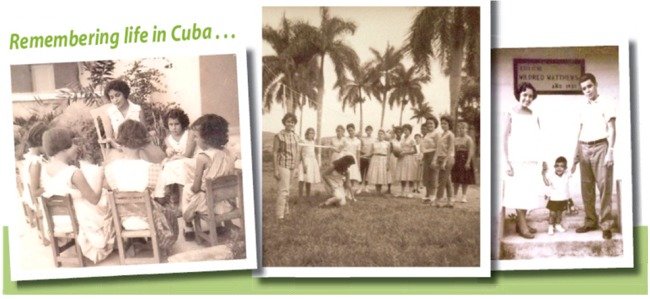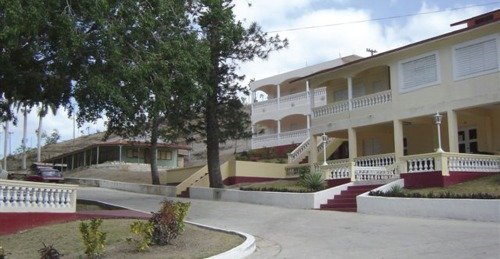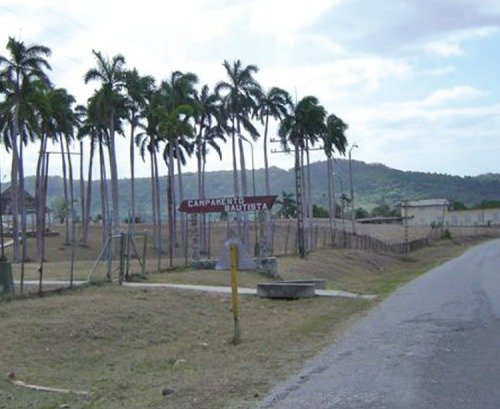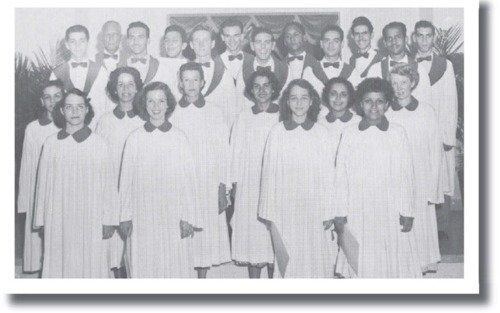Originally posted Jan. 31, 2008
 Gilda Cabrera Reyes, a Cuban native now a member of First Baptist Tucker, lists many fond memories of life in her home country. At far left, Reyes leads a Sunbeam group at the seminary in Havana in 1955. In middle, she pauses at left with a youth group. At right, she stands with her husband, Reinaldo, and the couple’s son, Rey, in front of a building named in honor of Mildred Matthews, an American missionary. GILDA CABRARA REYES/Special[/caption]
Gilda Cabrera Reyes, a Cuban native now a member of First Baptist Tucker, lists many fond memories of life in her home country. At far left, Reyes leads a Sunbeam group at the seminary in Havana in 1955. In middle, she pauses at left with a youth group. At right, she stands with her husband, Reinaldo, and the couple’s son, Rey, in front of a building named in honor of Mildred Matthews, an American missionary. GILDA CABRARA REYES/Special[/caption] DULUTH — Ruth* has happy memories of growing up on Cuba. Her family lived in a house built by her grandfather. The sounds of cows, pigs, turkeys, and horses could be heard on their farm in a small valley. Vacations were taken at a nearby beach that postcards try to recreate.
“What I remember is that it was never cold with beautiful scenery,” she said. “I loved it.”
It all changed in 1959, the year Fidel Castro led a revolution and subsequently became prime minister and Comandante en Jefe of the Cuban armed forces. In 1963, Ruth’s father was imprisoned and the farm collectivized “for the good of Cuba.” They would continue to visit her father until 1968, when they left the island nation. It would be eleven years before they saw him again.
With Castro’s health in decline, rumors of his demise easily take on a life of their own. The latest flurry hit the Internet and, particularly, the Little Havana community in Miami, Aug. 24.
 Georgia Baptists who attended the Yumuri Baptist Camp in Cuba remember the beautiful setting where retreats for music, Girls in Action, Royal Ambassadors, youth, and various other church functions were held. One former attendee recalled a youth camp with so many students the dorms filled up and tents were pitched on the grounds to accommodate everyone. Yumuri Camp was taken over by the government when Fidel Castro came into power but was eventually placed back into the hands of the Cuban Baptists. DAVID PENA/Special
Georgia Baptists who attended the Yumuri Baptist Camp in Cuba remember the beautiful setting where retreats for music, Girls in Action, Royal Ambassadors, youth, and various other church functions were held. One former attendee recalled a youth camp with so many students the dorms filled up and tents were pitched on the grounds to accommodate everyone. Yumuri Camp was taken over by the government when Fidel Castro came into power but was eventually placed back into the hands of the Cuban Baptists. DAVID PENA/SpecialToday a member of a Georgia Baptist church, Ruth experiences the same emotions as others whenever rumors of Castro’s death leak from Havana. She admits her first emotion is happiness followed by disappointment when they are found to be untrue. However, she still maintains that it’s wrong to pray for his death.
“I pray for a better government in Cuba,” she said. “I also pray for a better economy and issues such as freedom of speech. I despise the things Castro has done to my country. It’s sad to see current photos and how things have changed.”
“It’s hard to see your country being almost destroyed by an ineffective system,” agreed Samuel Aleman, pastor of First Spanish Baptist Church in Decatur. “But over all of it, the love of Christ on the cross is He died even for Castro.”
Shortly after taking control, Castro began the process of collectivization that led to the seizing of family-owned farms and businesses. Those with dissenting opinions on the government’s direction were rounded up into labor camps as “counterrevolutionaries.” Those not imprisoned saw their only option as leaving their homes.
To increase the chances of more family members successfully reaching the United States and elsewhere, it was common for aunts and uncles to emigrate with nieces and nephews.
“The story of the Cuban people cannot be understood by the average non-Cuban,” said Gilda Cabrera Reyes, a Sunday School teacher at First Baptist Tucker. “Families were separated because permission [to leave] would be granted for some but not others.”
 Another image of the Yumuri Baptist Camp in Cuba. DAVID PENA/Special
Another image of the Yumuri Baptist Camp in Cuba. DAVID PENA/SpecialReyes and her husband, Reinaldo, came to the United States in 1962. The couple traveled with their nephew, then a toddler. Arriving in the U.S. reunited them with their four-year-old son, who had escaped earlier with Reyes’ sister. It also joined them with her father, who had arrived four months earlier after being fired from his 30-year managerial position with Cuban Electric Company.
“He had also owned his own advertising business,” added Reyes. “That was taken from him because he was well known as being anti-communist. The regime had started seizing all private businesses.”
Nevertheless, she says that praying for Castro’s death is wrong.
“‘ will take care of Castro when his time comes,” she said. “I can understand, though, how those whose father, husband, brother, or sister who was tortured or assassinated by the Castro regime would pray for that, especially if they do not have deep Christian principles.”
Speaking against communism and helping other families escape Cuba got Ruth’s father 16 years in prison. He’s now in his late seventies and still doesn’t talk to his family about being tortured as a “political prisoner.” At least once he was lined up with others in front of a firing squad. When the shooting stopped he was the only one still alive.
 This choir picture is indicative of the previous Baptist presence in Cuba. Georgia Baptist Gilda Cabrera Reyes stands second from the right on the second row. Her husband, Reinaldo, stands on the third row at the far left. Choir director Marjorie Caudill, Southern Baptist missionary to Cuba with her husband, Herbert, stands to Reyes’ left in the second row on the far right. The couple’s daughter, Jane, is in front row, second from left. GILDA CABRERA REYES/Special[/caption]
This choir picture is indicative of the previous Baptist presence in Cuba. Georgia Baptist Gilda Cabrera Reyes stands second from the right on the second row. Her husband, Reinaldo, stands on the third row at the far left. Choir director Marjorie Caudill, Southern Baptist missionary to Cuba with her husband, Herbert, stands to Reyes’ left in the second row on the far right. The couple’s daughter, Jane, is in front row, second from left. GILDA CABRERA REYES/Special[/caption] Despite all this, Ruth thinks she knows her father’s heart.
“I don’t think he would pray for [Castro’s] death,” she said. “He would pray for a better government in Cuba.”
Reyes’ memories of Cuba are dominated by how Southern Baptists shaped the spiritual landscape.
“My family is a product of Home Missions,” she said. “ were our friends. We became Christians and joined McCall Baptist Church, which met at the Baptist Theological Seminary building in the 50s. There were – and still are – many Baptist churches in Cuba winning souls.”
Aleman says there is something else to keep in mind when praying for his homeland.
“The most amazing thing that could happen would be for Castro to open his heart to Jesus – in public – and confess all his crimes against his people and.
“That would be the greatest miracle of all.”
*Name changed for security reasons